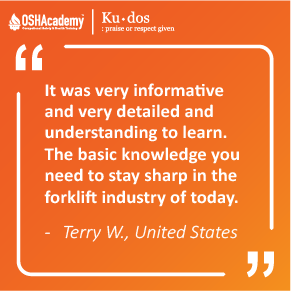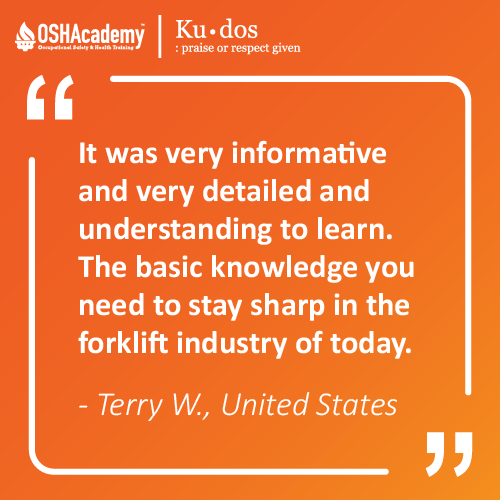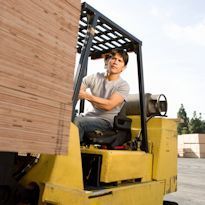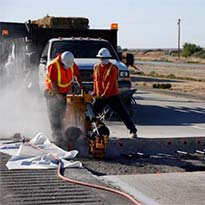620 OSHA Forklift Certification
This course covers the principles necessary to understand safe forklift operation. Completing this course is the first step in obtaining certification as a forklift operator.
IACET Accreditation
OSHAcademy is accredited by the International Accreditors for Continuing Education and Training (IACET) and offers IACET CEUs for courses that meet ANSI/IACET standards. IACET is globally recognized for promoting the quality of continuing education and training.

Free Access
As an OSHAcademy student, you have free access to all our training materials, including knowledge checks and course activities. Documentation of your training–such as exam scores, certificates, and transcripts–can be accessed by purchasing a certificate package.
Important Information
To achieve full certification as a forklift operator, the student must also participate in hands-on practice operating the forklift in the learning environment under the supervision of a competent person. Once the competent person deems the student has adequate knowledge and skills, the employer must evaluate and formally certify that the student has adequate abilities and is qualified to operate the forklift.
| Modules: | 4 |
| Hours: | 2 |
| Sectors: | General Industry |
| IACET: | 0.2 CEUs |
Fee
- FREE Access
- $ PDF & Original Certificates
- $ Original Certificate
- $ PDF Certificate
*Shipping & Handling not included.
-
Key Topics
-
Target Audience



Module 1: Types of Forklifts
This module sets the foundation with an overview of industrial trucks. Key topics include:
- Basics of powered industrial trucks
- Appropriate and inappropriate scenarios for using these vehicles
- Selecting the right forklift for the environment
You'll learn to:
- Identify the seven main classes of powered industrial trucks as defined by OSHA
- Differentiate between safe and unsafe practices
- Understand the primary power sources used
Module 2: How a Forklift Works
Here, the focus is on the practical aspects of operation. Topics include:
- Navigating right-of-way situations
- Ensuring secure loading
- Operating under challenging conditions
By the end, you'll be able to:
- Implement best practices for busy worksites
- Recognize the significance of load-handling safety
- Optimize safety in hazardous conditions
Module 3: Operating the Forklift
Avoiding and managing hazards is crucial. This module explores:
- Forklift safety while traveling
- Loading/unloading forklifts
- Identifying workplace hazards and operator errors
- Reporting incidents effectively
You'll develop the ability to:
- Spot conditions leading to potential hazards
- Connect operational errors to accidents and other risks
- Establish safety procedures to mitigate hazards
Module 4: Maintenance
Maintenance ensures long-term operational safety. Expect to learn about:
- Routine checks before, during, and after operation
- Determining when a truck should be withdrawn from service
This module empowers you to:
- Appreciate regular maintenance as a preventive tool
- Preventing injury while doing forklift maintenance
- Implement safety protocols during maintenance activities
This comprehensive course structure aims to provide a robust understanding of forklift and powered industrial truck use, ensuring safety and efficiency in the workplace. Whether you're new to the field or need a refresher, these modules offer valuable insights and practical skills.
This OSHA forklift training certification course is tailored for individuals aiming to acquire OSHA-compliant forklift operator certification. Participants will gain skills in the safe operation of forklifts, also known as powered industrial trucks, essential for construction and general industry applications.
To legally operate these machines, operators must be at least 18 years old. Our comprehensive online forklift certification classes cover a range of forklift types, preparing you for diverse workplace requirements:
- Class I: Electric motor rider trucks
- Class II: Electric motor narrow aisle trucks
- Class III: Electric motor hand trucks or hand/rider trucks
- Class IV: Internal combustion engine trucks (solid/cushion tires)
- Class V: Internal combustion engine trucks (pneumatic tires)
- Class VI: Electric and internal combustion engine tractors
- Class VII: Rough terrain forklift trucks
This course is specifically designed for those in the construction, general industry, maritime, and agricultural sectors unless exempt by applicable OSHA standards. It does not apply to compressed air or nonflammable compressed gas-operated industrial trucks, nor to farm vehicles, nor to vehicles intended primarily for earth moving or over-the-road hauling.
This OSHA forklift training certification course is tailored for individuals aiming to acquire OSHA-compliant forklift operator certification. Students will gain skills in the safe operation of forklifts, also known as powered industrial trucks, essential for construction and general industry applications.
According to OSHA standard 1910.178, it's mandatory for employers to ensure that all forklift operators are thoroughly trained and certified. The certification process involves three key components: formal instruction, practical training, and a performance evaluation. Our online course satisfies the formal instruction requirement, covering all necessary topics such as operation instructions, warnings, precautions, steering, maneuvering, load capacity, inspections, and maintenance.
While you complete the formal instruction online, your employer is responsible for providing practical training and conducting a performance evaluation. This on-site training and evaluation must be carried out by a qualified person certified to train powered industrial truck operators. Successfully completing these steps will officially certify you to operate a forklift, ensuring you meet OSHA's safety and compliance standards.
To legally operate these machines, operators must be at least 18 years old. Our comprehensive online forklift certification classes cover a range of forklift types, preparing you for diverse workplace requirements:
- Class I: Electric motor rider trucks
- Class II: Electric motor narrow aisle trucks
- Class III: Electric motor hand trucks or hand/rider trucks
- Class IV: Internal combustion engine trucks (solid/cushion tires)
- Class V: Internal combustion engine trucks (pneumatic tires)
- Class VI: Electric and internal combustion engine tractors
- Class VII: Rough terrain forklift trucks
This course is specifically designed for those in the construction, general industry, maritime, and agricultural sectors unless exempt by applicable OSHA standards. It does not apply to compressed air or nonflammable compressed gas-operated industrial trucks, nor to farm vehicles, nor to vehicles intended primarily for earth moving or over-the-road hauling.
When it comes to operating a forklift, a common question is whether a driver's license is necessary. The answer is no; a state-issued driver's license is not required for forklift operation. However, it is essential to understand that while federal regulations don't mandate a traditional driver's license, individual employers can implement their own criteria for forklift operators.
Key Points to Consider:
- Federal Regulations: The Occupational Safety and Health Administration (OSHA) does not mandate a driver's license specifically for forklift operation.
- Employer Requirements: Companies have the liberty to set their own standards and might ask for additional certifications or criteria, including a regular driver's license, depending on their policies.
- Operator Certification: Although a driver's license isn't needed, OSHA does require that forklift operators be properly trained and certified to ensure
- safety and competence on the job.
Understanding these elements will help clarify what is needed to operate a forklift at your workplace. Always check with your employer to see if they have additional requirements beyond what federal guidelines stipulate.
To earn your OSHA forklift certificate, you must complete each of the course's four modules, and pass a comprehensive final exam. You have an unlimited number of attempts to pass the final exam.
You have 120 minutes to complete the final exam, which includes 20 questions and covers all course topics. You must score at least 70% to pass the exam.
Upon passing the final exam, you'll need hands-on training and a workplace performance evaluation, as mandated by OSHA, to obtain your official forklift license. OSHAcademy provides a Forklift Operator Evaluation Form for your employer to assess your proficiency. Evaluation areas include:
- Traveling
- Picking up a load
- Putting down a load
- Parking
- Fueling and battery recharging
- Forklift inspections
After passing the evaluation and completing necessary paperwork, you'll be officially forklift certified by your employer, in line with OSHA certification standards. This certification is valid for three years, after which you must undergo another performance evaluation. OSHAcademy advises all forklift operators undertake refresher training upon the expiration of the certificate. The forklift certificate will be valid for three years.
Yes. This course fully meets OSHA requirements for forklift certification, covering all essential topics for forklift operators.
Choosing an online forklift certification course offers numerous advantages that can streamline your journey to becoming certified. Here's why it might be the right choice for you:
- Convenience at Your Fingertips: With a 100% online format, you can complete the course from anywhere, eliminating the need to travel to a physical location.
- No Testing Anxiety: OSHAcademy's course is designed to help you succeed, giving you confidence and peace of mind as you work through the material. Easy-to-Follow Content: OSHAcademy's clear, concise material helps make the process straightforward and manageable.
- Long-Lasting Certification: Your certificate remains valid for a significant period, giving you ample time before any renewals are required.
- Cost-Effective with Group Rates: If you're enrolling a team, check out our business benefits to maximize savings for your organization.
Opting for an online course not only provides flexibility and ease but is also a practical step toward achieving your certification with confidence.
Yes. This course fully meets OSHA requirements for forklift certification, covering all essential topics for forklift operators.
The course complies with OSHA's standards for both general industry and construction, ensuring you receive comprehensive training. In just two hours, you'll delve into all necessary formal instruction topics required to earn your forklift license. You'll also gain the skills needed to safely operate a wide range of forklifts, from Class I through Class VII.
This structured approach ensures you are well-prepared to meet industry expectations and operate forklifts safely and efficiently.
Your forklift certification lasts three years. Upon expiration, you must undergo another employer evaluation to maintain your certification. OSHAcademy advises refresher training for all forklift operators after certification renewal.
Our OSHA-compliant forklift certificate is valid across all states and territories under OSHA's jurisdiction. This means you can confidently present your certification from coast to coast, knowing it meets federal safety standards everywhere OSHA has authority.
However, transferring certification to a different employer or state may vary. Often, recertification is needed when switching employers due to distinct forklift policies or different forklift types. Additionally, each job site has unique forklift hazards that require familiarization.
While your certification is universally valid, it's essential to check with your new employer or state regulations to determine if additional training or recertification is necessary. This ensures that you are fully prepared for any specific requirements or environments you may encounter.
Discovering comprehensive resources for forklift safety and training is crucial to maintaining a safe working environment. Below are some valuable links and materials that can elevate your understanding and implementation of forklift safety protocols:
- General Industry Forklift Training Standards: Explore detailed guidelines for forklift training under the general industry standards to ensure compliance with best practices.
- Construction-Specific Forklift Training Rules: Understand the unique requirements and safety standards for operating forklifts in a construction environment.
- Overview of Forklift Classifications: Familiarize yourself with different forklift types and classes, essential for matching the right machinery to specific tasks within your workplace.
- Daily Checklist Templates for Powered Industrial Trucks: Use sample daily checklists to systematically inspect forklift equipment, ensuring operational safety and efficiency.
- Comprehensive Resources on Powered Industrial Trucks: Access a variety of materials and guidance documents that augment safe practices and protocols concerning the use of forklifts and other industrial vehicles.
- Forklift Safety Quick Reference Guide: Download a quick reference card providing essential tips and practices for maintaining safety while operating forklifts.
- Safety Alerts for Forklift Usage: Stay updated with alerts that highlight key safety measures for protecting workers who operate or are in the vicinity of forklifts.
By leveraging these resources, you can significantly enhance workplace safety and ensure adherence to prescribed safety standards.
When it comes to operating a forklift, you might encounter several terms like forklift license, certificate, and certification. Though often used interchangeably, they have distinct meanings.
Forklift Certification
Forklift certification is a comprehensive term that refers to the process of being trained and evaluated to operate a forklift safely. It confirms that an individual has successfully completed all necessary training requirements. Certification involves both theoretical learning and practical evaluation. Training providers, regulatory bodies, and employers usually require this to ensure compliance with safety standards.
Forklift Certificate
A forklift certificate is the document you receive upon successfully completing your certification training. It serves as formal proof that you have undergone the required training and understand how to operate a forklift safely. This certificate can often be provided in digital form, allowing immediate proof of your training to employers.
Forklift License
While the term "forklift license" is commonly used, it can be misleading. Unlike a driver's license issued by a government authority, a forklift license is typically a wallet-sized certification card that demonstrates you are certified to operate a forklift. This durable card can be carried during work shifts to readily show proof of your forklift operation qualifications.
Key Differences
- Certification is the overall process of training and evaluation.
- A Certificate is the physical or digital proof of having completed your forklift training.
- A License refers to the portable card often called a license, used for on-the-spot verification but not officially government-issued like a driver's license.
By understanding these distinctions, you can better navigate the requirements for becoming and remaining a qualified forklift operator.
Yes. Students and employers can validate the course 620 OSHA Forklift Certification training certificate using our website. It's quick and easy! You can feel confident knowing the certificate is valid and was issued by OSHAcademy.







